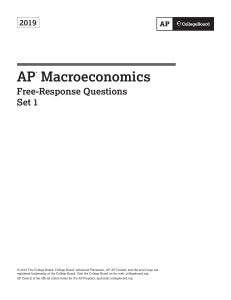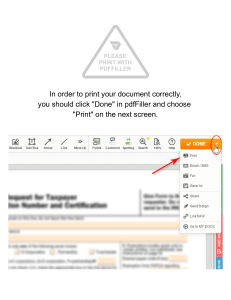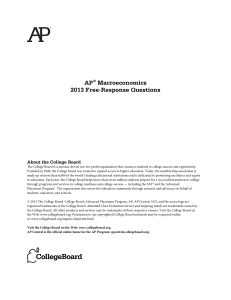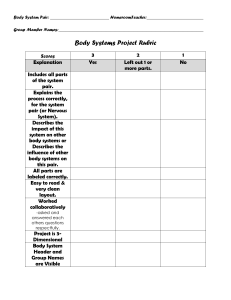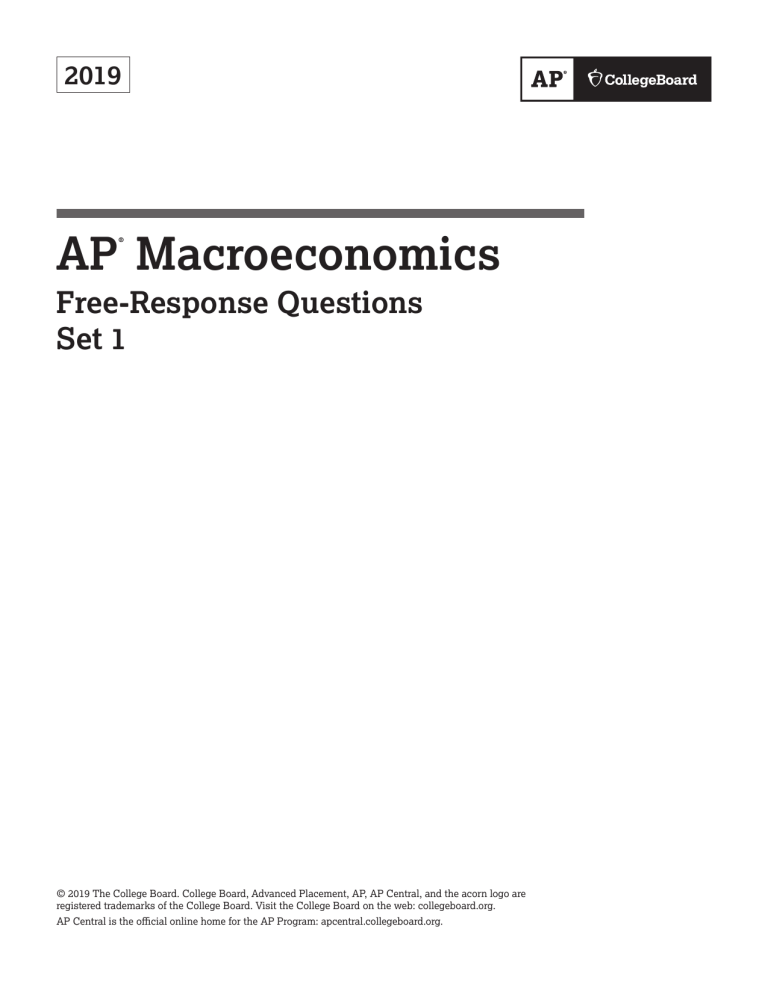
2019 AP Macroeconomics ® Free-Response Questions Set 1 © 2019 The College Board. College Board, Advanced Placement, AP, AP Central, and the acorn logo are registered trademarks of the College Board. Visit the College Board on the web: collegeboard.org. AP Central is the official online home for the AP Program: apcentral.collegeboard.org. 2019 AP® MACROECONOMICS FREE-RESPONSE QUESTIONS MACROECONOMICS Section II Total Time—1 hour Reading Period—10 minutes Writing Period—50 minutes Directions: You are advised to spend the first 10 minutes reading all of the questions and planning your answers. You will then have 50 minutes to answer all three of the following questions. You may begin writing your responses before the reading period is over. It is suggested that you spend approximately half your time on the first question and divide the remaining time equally between the next two questions. Include correctly labeled diagrams, if useful or required, in explaining your answers. A correctly labeled diagram must have all axes and curves clearly labeled and must show directional changes. Use a pen with black or dark blue ink. 1. Canada is an open economy that is currently in a recessionary output gap. (a) Draw a correctly labeled graph of the long-run aggregate supply, short-run aggregate supply, and aggregate demand curves, and show each of the following. (i) The current equilibrium real output and price level, labeled as Y1 and PL1, respectively (ii) Full-employment output, labeled Yf (b) The central bank and the government do not take any policy actions to close the output gap. (i) Explain how the economy will adjust to full employment in the long run. (ii) On your graph in part (a), show how the economy adjusts to full employment in the long run. (c) Suppose the Canadian government is unwilling to wait for the long-run adjustment process. The marginal propensity to consume is 0.8. The equilibrium real output is $500 billion and the full-employment output is $540 billion. (i) Calculate the minimum change and indicate the direction of change in government spending required to shift the aggregate demand curve by the amount of the output gap. (ii) Calculate the minimum change and indicate the direction of change in taxes required to shift the aggregate demand curve by the amount of the output gap. (d) Assume instead that the Canadian central bank takes actions to restore the economy to full-employment output by influencing investment spending. Draw a correctly labeled graph of the money market, and show the effect of the actions taken by the central bank on the equilibrium interest rate. (e) Canada and Mexico are trading partners. Draw a correctly labeled graph of the foreign exchange market of the Canadian dollar, and show the effect of the change in the interest rate in part (d) on the value of the Canadian dollar with respect to the Mexican peso. © 2019 The College Board. Visit the College Board on the web: collegeboard.org. -2- GO ON TO THE NEXT PAGE. 2019 AP® MACROECONOMICS FREE-RESPONSE QUESTIONS 2. Assume the expected inflation rate in a country is 3%, the current unemployment rate is 6%, and the natural rate of unemployment is 4%. (a) Draw a correctly labeled graph of the short-run and long-run Phillips curves. Label the current short-run equilibrium as point X and plot the numerical values above on the graph. (b) Is the actual inflation rate greater than, less than, or equal to the expected inflation rate of 3%? (c) Assume loans were made taking into account the expected inflation rate of 3%. Will lenders be better off or worse off after they realize the actual inflation rate identified in part (b) ? Explain. (d) Based on the relationship between the actual and the expected inflation rates identified in part (a), what will happen to the natural rate of unemployment in the long run? 3. Assume that households in Econland increase their savings for retirement. (a) Using a correctly labeled graph of the loanable funds market, show how the increase in savings will affect the equilibrium real interest rate. (b) Based solely on the real interest rate change identified in part (a), what will happen to Econland’s purchases of foreign assets? Explain. (c) Consider the foreign exchange market for Econland’s currency. (i) Based on your answer to part (b), what will happen to the international value of Econland’s currency? (ii) Based on your answer to part c (i), would Econland’s central bank buy or sell its currency in the foreign exchange market to offset the change in the value of its currency? STOP END OF EXAM © 2019 The College Board. Visit the College Board on the web: collegeboard.org. -3-

